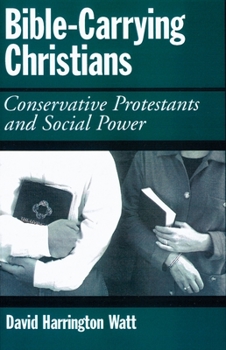Bible-Carrying Christians: Conservative Protestants and Social Power
Select Format
Select Condition 
Book Overview
In the United States, there are hundreds of thousands of Protestant churches whose members habitually carry their Bibles with them. These churches--often referred to as "evangelical" or "fundamentalist"--play a crucial role in shaping American society. In this book, David Watt draws on years of fieldwork to present an elegant reinterpretation of the way that conservative Protestants influence American politics and culture. At the heart of the book...
Format:Hardcover
Language:English
ISBN:0195068343
ISBN13:9780195068344
Release Date:March 2002
Publisher:Oxford University Press
Length:176 Pages
Weight:0.75 lbs.
Dimensions:0.8" x 5.7" x 8.5"
Customer Reviews
2 ratings
The Power and the Glory
Published by Thriftbooks.com User , 22 years ago
In the book's introductory chapter, David Watt explains that his interest in examining evangelical authority stems from his own upbringing as a conservative Baptist. Like many young evangelicals, however, he began to question the strictures of evangelical orthodoxy and orthopraxy in college and has since joined the Episcopalian church (also like many young educated evangelicals). Lately there have been a number of books by disaffected or former evangelical Protestants that examine their old subcultures. Randall Balmer's output, for example, has almost exclusively dealt with this issue. Watt joins the chorus of evangelical dissidents and exiles who, with what they believe is an insider's perspective, want to take a fair-minded look at the kinds of churches they grew up in. Watt's unique contribution to this burgeoning sub-genre is an examination of how power is exercised in churches. Many of the studies done on evangelicalism focus on its language, mores, beliefs, or political strategies, and this book is a refreshing change from those now well-traveled subjects.Watt looks at three churches: Oak Grove Church, Philadelphia Mennonite Fellowship, and Philadelphia (International) Church of Christ. The first is a fairly typical middle to upper-middle class evangelical megachurch, the second is a small, politically liberal and pacifist urban congregation, and the third is a branch church of a sect that many other evangelicals consider "cultish" or heretical. The most interesting things that Watt notices about Oak Grove is the unusual amount of respect given to people involved in business or some other capitalist enterprise, and the near-total power of the senior minister at church administration meetings. In this conservative church, submission to authority--to a husband, or the pastor's, or the free-market system--was routinely emphasized. Watt, now a liberal, is critical of these tendencies, which are actually tendencies found in much of the Religious Right (Pat Robertson is known for linking the Kingdom of God itself with capitalism). He talks much about "asymmetrical" power relationships that he disapproves of; he compares it to the democratic, congregational style of decision making and culture in the Baptist churches of his youth. In some ways his objection is puzzling. Certainly one of the dangers is that an all-powerful single leader, like a pastor, can become a dictator, but there are no indications in the book that this is actually so. Moreover, he is now part of a church that has a very hierarichal structure, the Episcopalian church (though it does take stances a liberal would be more amenable to). However, his critique of the church's swallowing of capitalist ideology is more astute, and is a telling aspect of a much-overlooked aspect of evangelical compromise with the larger culture that it so opposes on other points.The Mennonite fellowship is in many ways an anomaly in the landscape of American evangelicalism, a representative of the smal
How like and unlike we are
Published by Thriftbooks.com User , 22 years ago
David Harrington Watt takes a sympathetic, personal and critical view of three different churches in the metropolitan Philadelphia area. His look at a small fundamentalist church, a grassroots urban Mennonite congregation, and a market-driven "megachurch" illustrate the very different ways that Christians see their mission in the world and their relations to social, political, and economic structures. Watt reveals parts of his personality and his emotional reactions to what goes on in each church, but he also carefully analyzes the power structures, ethnic diversity, and gender roles in each congregation in an astute yet easily readable way. A must read for anyone wanting to get personal glimpses of the vast array of people seeking to be true to the Bible in very different ways.






